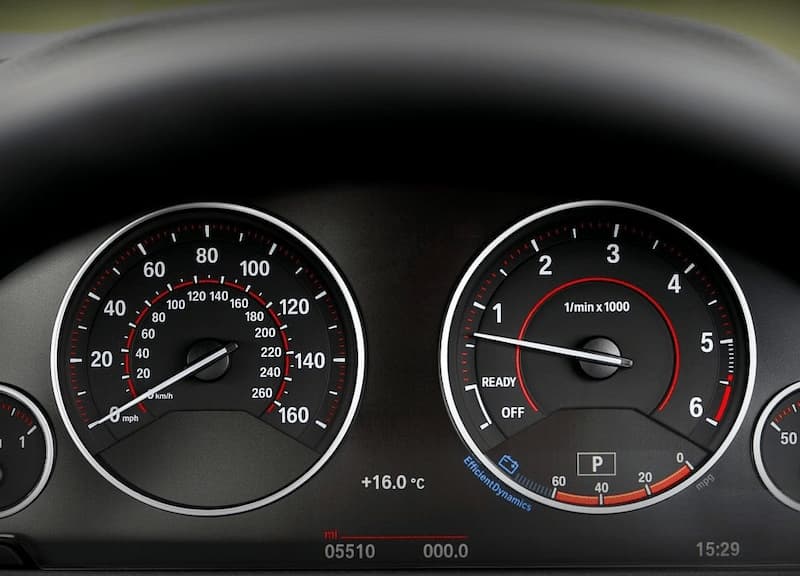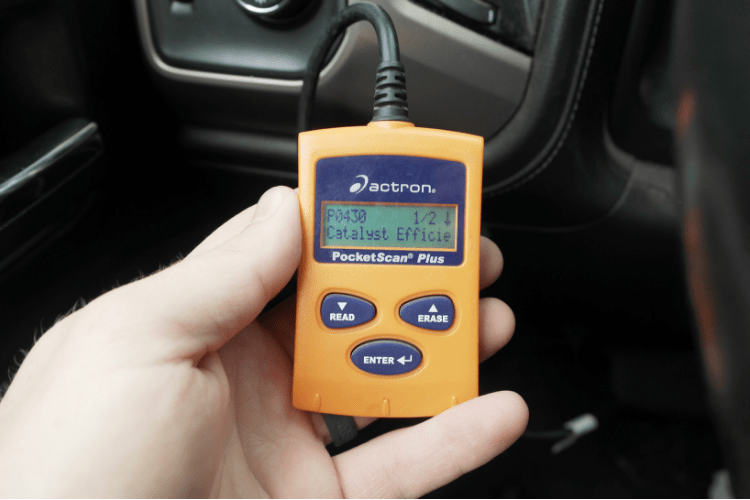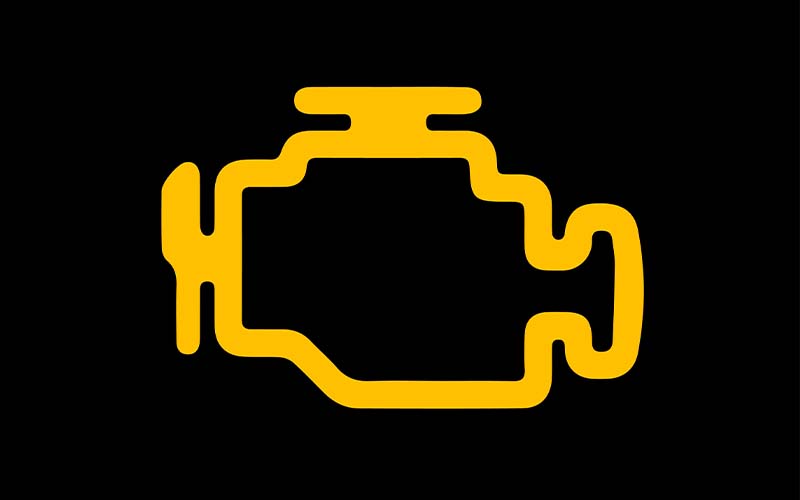Continue reading to learn more about the causes and symptoms of engine misfires, as well as why check engine lights flash.
Generally, there are four common reasons. They are Misfiring Engine, Low Fuel Pressure, Faulty Engine Sensor, and Low Compression.
Is the check engine light on? If so, it’s critical to identify the issue right away to prevent further, expensive damage to your car. A very serious issue is present if the check engine light is flashing, so you should stop the car right away and have it towed to our repair shop.
Causes of a Flashing Check Engine Light
The most frequent reason for a check engine light to flash or blink is a misfiring engine, which can be brought on by a number of different engine problems. To determine the root of the problems, you should ideally troubleshoot the vehicle and examine the DTCs.
Here are four reasons that might be responsible, for the time being.
Misfiring Engine
One or more cylinders fail to produce the necessary amount of power when an engine misfires. Numerous issues, many of which can also result in a flashing Check Engine Light, can cause a misfire. You could have a vacuum leak, a malfunctioning oxygen sensor, or fouled-out spark plugs, for instance.
You experience a loss of acceleration when the engine misfires. When you attempt to travel more quickly, the car may also begin to tremble. For a while, it might feel like the car is losing power. The engine may feel like it vibrates more than usual when it is at idle. Misfires are problematic because they can happen infrequently or only when the engine is a certain temperature.
Driving with an engine that is misfiring is never a good idea. The engine in you has the potential to break down at any time. Additionally, you are causing additional wear to other car components. If that’s not enough, the engine will use more fuel during this time, increasing emissions.
Low Fuel Pressure
To ensure proper operation, the combustion chamber must have the proper ratio of fuel to air. Serious issues may arise if the engine is starved of fuel and the fuel pressure is too low. Bad injectors, a malfunctioning regulator, a broken pump, a clogged fuel filter, or a faulty sensor can all contribute to low fuel pressure.
You might experience difficulty accelerating if the fuel pressure is low. As a result, the engine might also misfire or stall. Additionally, fuel-related issues frequently produce a whining sound. Low fuel pressure can cause the engine and essential parts to become more worn out.
Faulty Engine Sensor
Numerous sensors located inside the engine work together to provide data to the computer. Using this data, the computer decides how to operate more effectively. A bad sensor would result in inaccurate data being sent to the computer. This issue can result in the computer making decisions that it shouldn’t, which causes an imbalance and significant performance issues.
Both the oxygen sensor and the mass airflow sensor are among the most frequent sensor malfunctions. However, the coolant temperature sensor or any other high-tech component could also be having issues. Scan the codes is the only way to know for sure which one is the issue.
Low Compression
In addition to compression, the engine needs air, fuel, and a fuel supply to run. Performance problems will arise unless the compression reaches a precise pressure level. When there is insufficient compression, the car may jerk, lose power, and not be able to accelerate.
The most common reasons for compression problems include faulty head gaskets, worn pistons, damaged piston rings, and valve issues. A bad timing belt or chain, however, could also be the cause of the issue.

What Happens When Flashing Check Engine Lights Turn On?
Your dashboard will display a blinking check engine light when an engine misfire occurs, almost always. In the event of a misfire, unburned fuel will be released into the exhaust system of your vehicle. Engine misfiring is a serious problem because it can quickly increase the catalytic converter’s temperature. The catalytic converter will suffer damage and need pricey repairs if the temperature rises too much. It might be serious enough to cause a fire in your car.
Fix a Flashing Check Engine Light
When the Check Engine Light begins to flash, you must immediately stop driving. Once you’ve been stopped, follow these instructions to solve the problem.
Scan Trouble Codes
Read the trouble codes first before attempting to fix a flashing check engine light. You can read the DTCs that are stored in the computer using your skilled code scanner. Some OBDII scanners read more codes than others, but you can use any of them to figure out what’s wrong.
There are alternative options if you don’t have a scanner of your own. Visit an auto parts shop where they provide free scanning services. Depending on the trouble codes you discover, you should continue the troubleshooting. On Mechanic Base, there is a library where you can learn more about various trouble codes.
Inspect Spark Plugs and Ignition Coils
Check the spark plugs if the codes indicate that the ignition system is at fault. The plug may malfunction if carbon accumulates on it. Replace the spark plug; that is the only remedy.
You will also need to replace the ignition coils if the code indicates a problem with them. The trouble code ought to show the malfunctioning coil.
Check Fuel Pressure
You can use a specialized gauge to check the fuel pressure. See where it should be by performing a routine read-through of your service manual.
Additionally, you can check the fuel pressure using some sophisticated scanners. If it is too low, you need to identify the problematic component and replace it.
Inspect Engine Sensors
Every engine sensor on your car is out of reach for physical inspection. However, the code scanner ought to make it easier for you to identify the potential offender.
There’s a chance you can just clean it off and reinstall it once you identify the problematic sensor. If not, a substitute will be required.
Contact a Professional
You must take the flashing Check Engine Light seriously. This alert light signals that a serious situation is developing. This is why seeking professional advice can be beneficial at times.
With something as significant as your car’s engine, you don’t want to take any chances. Spend some time looking for a trustworthy repair facility, whether you require assistance with diagnostics or repairs.

Why Check Engine Lights Important?
While many people might be tempted to disregard a check engine light, the truth is that you should get the issue fixed right away. Driving with a damaged engine can seriously harm various engine parts and even result in more severe and expensive issues, like a blown catalytic converter.
Oxygen sensors and other components of the emissions control system could also sustain permanent harm. Avoiding your check engine light could result in long-term damage to your car that could cost you thousands of dollars more than necessary.
Even though a malfunctioning engine is typically the main cause of the check engine light flashing, it can also be a sign of more serious issues.
If you love chandeliers but have recessed lights in your home, we’ll show you how to convert a recessed light to a pendant.
FAQs
Can I Drive My Car With the Check Engine Light Blinking?
The rule of thumb is that if the check engine light is flashing, you can’t keep driving the car. It is an emergency, and it frequently denotes an engine misfire. If you continue to drive, you’ll probably do permanent harm, mostly to the pricey catalytic converter.
How Far Can I Drive With a Blinking Check Engine Light?
You may be able to keep driving indefinitely or only for a few days, depending on the problem that caused the Check Engine light to come on. The engine computer can recalibrate some sensors after traveling 50 to 100 miles, which may fix the issue.
How Much Does It Cost to Fix An Engine Misfire?
How much does it cost to repair a misfiring engine? Depending on the misfire’s cause, the repair and replacement cost might range between $100 and $1,000.
Conclusion
We cover the primary issues that should worry you if your check engine light is flashing throughout this guide. We also go over some actions you can take to solve the problem. Your top inquiries, like whether you should continue driving when the Check Engine Light starts flashing, will be answered when you reach the end of our article.
When the Check Engine Light is flashing, you are alerted to a serious issue that needs to be fixed right away. Low fuel pressure or a misfiring engine could be to blame. Incorrect engine sensors or low compression are other potential causes. You should immediately halt your vehicle in both cases.
There is no time to waste because a few seconds could determine whether or not your engine sustains damage. Find a secure location to stop, then shut off the engine as soon as the light begins to blink.
You have the opportunity to stop further harm by acting quickly. You can determine what went wrong and start the repair using a code scanner or with the assistance of a qualified mechanic.



